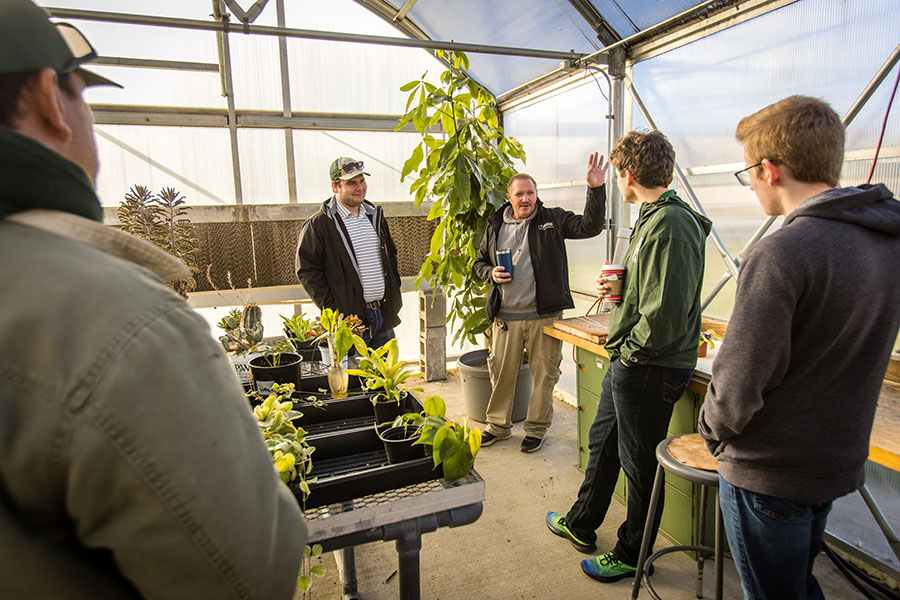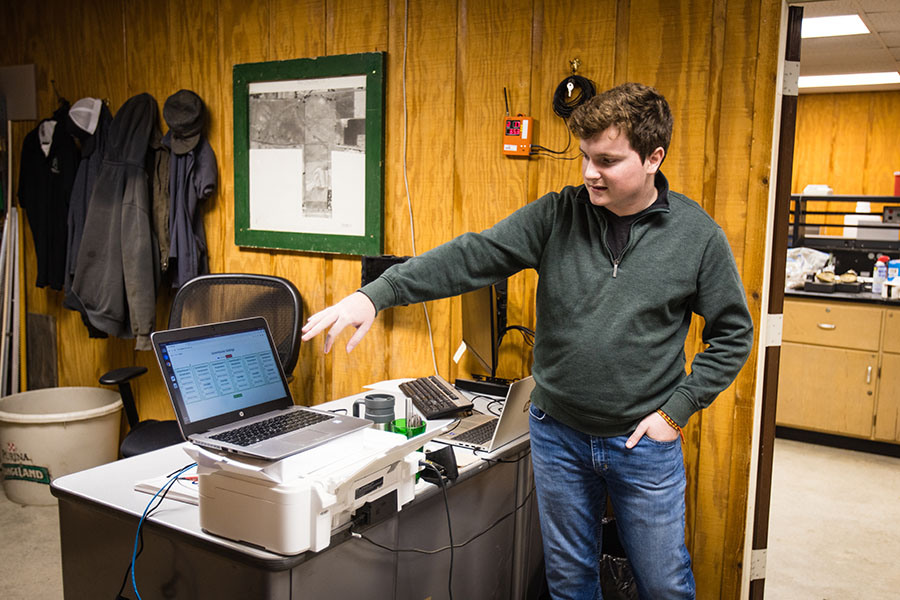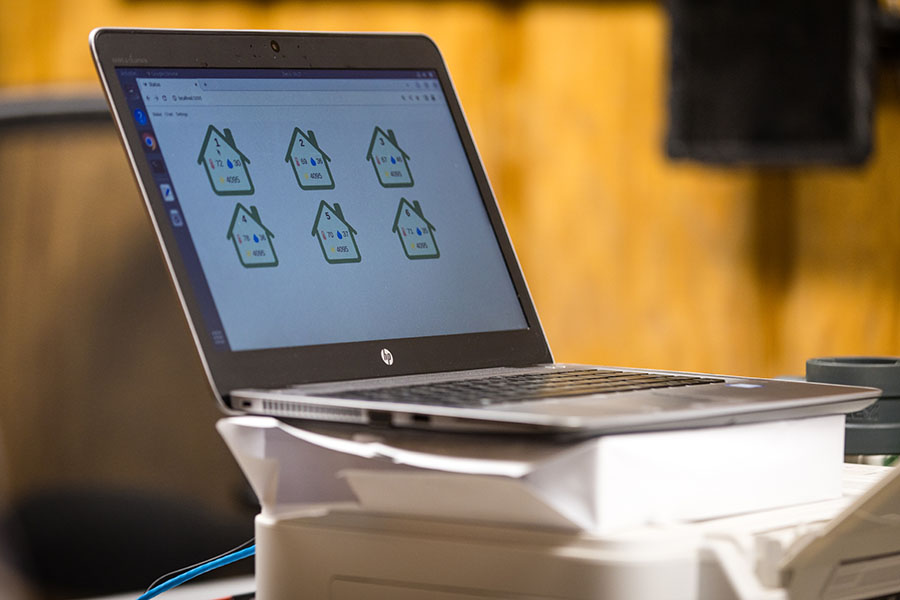The worlds of horticulture and computer science came together this fall to devise a system that will help the staff who manage Northwest Missouri State University’s greenhouses better maintain the plant life within them.
Students in the University’s Internet of Things course, under the instruction of Dr. Nathan Eloe, an associate professor of computer science and information systems, unveiled their project Wednesday during a demonstration for faculty and staff at Northwest’s Horticulture Complex.

Students in Northwest's Internet of Things course talk with Bryan Freemyer, an arboretum specialist at the University, about the sensor platform they set up inside the Horticulture Complex to better monitor plant life there. (Photos by Lauren Adams/Northwest Missouri State University)

Parker Christy, a senior computer science major from Humphreys, Missouri, describes how a base station receives data to help Horticulture Complex staff monitor conditions inside greenhouses.

Sensor platforms installed by students inside the Horticulture Complex’s greenhouses collect real-time data related to temperature, humidity and light, prompting notifications to Horticulture Complex staff.
The 30 students in Eloe’s class worked in seven separate teams to create a wireless mesh network of sensor platforms in the complex’s greenhouses. The sensors collect real-time data related to temperature, humidity and light within the greenhouses and send notifications to Horticulture Complex staff – thus, helping them better monitor conditions and deter any threats to plants if the environment deteriorates.
Eloe assigned the project to his students after a discussion with Dr. Alex Taylor, an assistant professor of agricultural sciences, about the need for a modern platform in the greenhouses to replace the complex’s antiquated monitoring system. The genesis for the idea was an incident during the winter of 2020-2021 when heaters failed overnight in one of the greenhouses, leading to the loss of plants stored in the facility. Information from the legacy system could only be accessed physically inside a staff office so any problems affecting plants usually went unnoticed until the next working day.
“The real value of the project is giving the students an opportunity to create a real working viable end product that is not ‘made up,’” Taylor said. “I am a big proponent of multi-disciplinary and project-oriented teaching and try to work it into all of my classes whenever possible. I have found that students appreciate this and can more easily see the practical applications of the knowledge we are trying to impart.”
In addition to assisting the School of Agricultural Sciences, the project provided students with insight into how some newer pieces of technology process and deliver data.
“There’s an appreciation for playing with hardware and just the things that go into things that we take for granted,” Eloe said. “Coming into this class, a lot of people hadn’t thought about, ‘Hey, what’s going on in my smartwatch or my smart device?’”
Students in Eloe’s course spent the first part of the fall semester learning to program and work with different kinds of sensors. The students then began interacting with agricultural sciences faculty and staff to learn about the importance of greenhouses in horticulture and agricultural production. They installed their system last week.
At a base station inside the Horticulture Complex’s classroom building, a computer chip collects all of the data supplied by the sensors. A web app then displays the data and delivers the notifications to staff.
“Every single time it receives new data, it’s going to check it against whatever bounds are set,” said Dawson McConnell, a senior cybersecurity major from Kansas City, Missouri, who worked on the team that set up the base station. “If something is out of bounds, it’s going to send them a notification that says greenhouse – whichever number – has a temperature or humidity or light level that is out of bounds, and it shows the actual, current data point.”
While students in the course agreed the project was the ultimate profession-based learning experience, Luke Vaughn, a native of Marceline, Missouri, took a broader interest. As a senior computer science major with an agriculture business minor, he grew up on a farm and now works at Northwest’s greenhouses as a student employee. Working on the project helped him see how his interest in developing software applications can be beneficial in the agriculture field.
“Given the opportunity to do this, I was really excited because it’s kind of mixing both of my passions,” Vaughn said. “Doing something where I can design software like this to help people like my parents and grandparents, that’s really what I want to do.”
With six teams working to install sensor platforms in the greenhouses, plus a team focused on setting up the base station, the students also benefited from applying their skills within varying levels of collaboration.
“There were seven teams, so not only are we having to collaborate amongst ourselves, but we’re also having to collaborate with six other teams that are all doing their own thing,” McConnell said. “So being organized and being flexible was a super important aspect to this.”
Anthony Jack, a senior computer science major from Independence, Missouri, added, “You’ve got to adapt to what kind of environment you’re going to be working in. I would not have thought that we would be working in greenhouses with all the technology that we did.”
Said Braeden Lhamon, a junior computer science major from Omaha, Nebraska, “In software development, you’re always going to be a part of a team that’s usually talking to other teams. So it’s just good experience to get into that.”